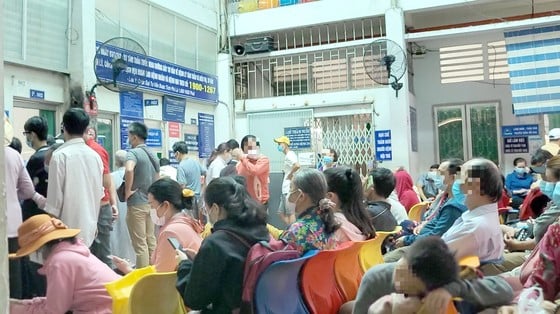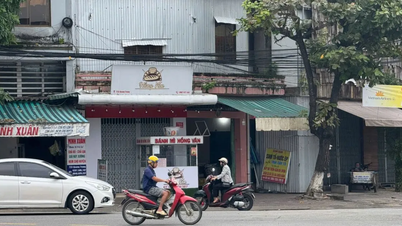SGGP
According to statistics from the Ministry of Health , in Vietnam, the prevalence of common mental disorders is 14.9% of the population (approximately 15 million people). However, only about 10% have access to formal treatment.
 |
| People waiting for examination at the Ho Chi Minh City Mental Hospital. |
Increase in patients
According to statistics from the Ho Chi Minh City Mental Health Hospital, in 2022 there were 216,942 patient visits at the hospital's three facilities , averaging about 800-900 visits per day. Of these, patients seeking treatment for anxiety disorders and mood disorders accounted for the highest percentage, approximately 36% and 25% respectively. Notably, after the Covid-19 pandemic, the number of visits and treatments for mental health-related illnesses increased significantly.
According to Master Bui Nguyen Thanh Long, Deputy Head of the Medical Professional Affairs Department of the Ho Chi Minh City Department of Health, the community-based mental health care network in Ho Chi Minh City is currently managing approximately 10,000 schizophrenia patients and 7,000 epilepsy patients. Ho Chi Minh City has implemented school-based mental health care, mental health care for healthcare workers, and is piloting a "depression emergency" service. However, the entire city only has about 90 doctors with licenses to practice mental health.
Dr. Lai Duc Truong, representative of the World Health Organization office in Vietnam, stated that the fact that only 10% of people with mental disorders have access to formal treatment creates a treatment gap of up to 90%. One reason for this situation is the misconception that mental illness is synonymous with schizophrenia (madness), but in reality, depression and anxiety are also mental disorders. The rate of schizophrenia in Vietnam is only about 0.3%-0.5%, but depression, anxiety disorders, and alcohol-induced psychosis account for up to 10%. Furthermore, mental health care in Vietnam is still limited as it is not integrated into the general healthcare system. Currently, only psychiatrists are authorized to diagnose mental illnesses, and district-level health facilities offer virtually no mental health services.
Insufficient facilities, weak workforce.
Recently, the Ho Chi Minh City Department of Health submitted a document to the Ho Chi Minh City People's Committee for approval of the "Healthcare Strategy on Mental Health Care for the People of Ho Chi Minh City from now until 2025 and beyond". The strategy was drafted by leading experts in psychiatry, clinical psychology, and neurology, and was reviewed and agreed upon by relevant departments and agencies.
According to Associate Professor Dr. Tang Chi Thuong, Director of the Ho Chi Minh City Department of Health, the workforce in the mental health sector has not met the actual needs. The number and quality of psychiatrists and psychotherapists (school, clinical, and occupational) are still low compared to the rest of the world. The infrastructure of the Ho Chi Minh City Mental Hospital has deteriorated and cannot accommodate the increasing number of patients. General hospitals and schools lack mental health clinics and psychological counseling services for early screening and timely treatment of mental health issues.
"The long-term orientation of mental health care for the city's residents will focus on prevention, early detection and screening of mental health problems in the community, treatment of mental health problems, and international cooperation in scientific research on mental health issues," Associate Professor Dr. Tang Chi Thuong informed.
Concurring with this view, Dr. Lai Duc Truong stated that the country currently has only 0.99 psychiatrists per 100,000 people; 2.89 psychiatric nurses per 100,000 people; and 0.11 psychological counselors per 100,000 people. In contrast, the world average figures are 1.7, 3.8, and 1.4 per 100,000 people, respectively. The field of psychiatry in Vietnam still faces many limitations in terms of infrastructure and doctor remuneration policies. Furthermore, psychiatrists are mainly concentrated in cities, leading to a significant treatment gap in provinces, especially in remote areas.
“The health sector in Ho Chi Minh City in particular, and the health sector nationwide in general, needs to ensure the provision of comprehensive mental health care services, integrating them into general healthcare, focusing on primary healthcare, while strengthening prevention and research in mental health. The urgent need now is to pay attention to mental health, placing it on par with physical health,” recommended Dr. Lai Duc Truong.
According to Associate Professor Dr. Luong Ngoc Khue, Director of the Department of Medical Examination and Treatment Management (Ministry of Health), mental disorders need to be diagnosed and treated promptly. Mental health care in the community is still limited, mainly focusing on treating schizophrenia and epilepsy. Medication options are also limited, and many patients experience intermittent medication use… Therefore, it is necessary to develop professional guidelines for diagnosis, treatment, and technical procedures in mental health to strengthen the capacity of the community mental health care system.
Source














































































































Comment (0)